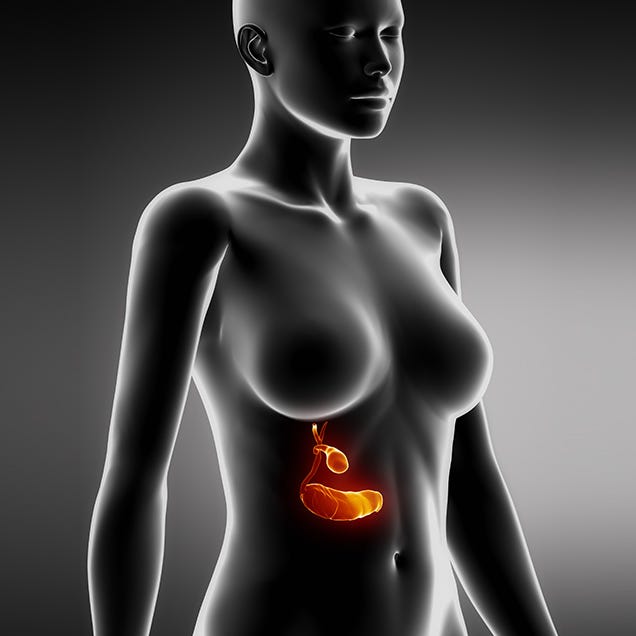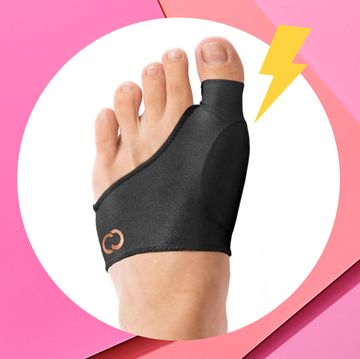When it comes to the gut, most people know the basic components: stomach, small intestine, large intestine. But there's handful of seldom-considered parts that don't get the attention they deserve, like the pancreas. Truth is, you know you have one, and that it's kinda important, but unless something goes wrong with it, you don't give it much thought.
But you should, because it's a vital part of your digestive system and critical to controlling your blood sugar. (A good way to imagine its size and shape: Touch your right pinky finger to your right thumb, and stick out the rest of your fingers. Now put your hand in the center of your belly, just under your ribs.)
Here's what else you should know about the tadpole-shaped organ that sits in your abdomen, near the stomach and curving toward the intestines.
As soon as you start eating, your pancreas pumps out a handful of essential enzymes and hormones necessary for digestion, including lipase and amylase. "These juices are secreted into the small intestine where they help break down protein and fats after they've left the stomach," says Reem Sharaiha, M.D., a gastroenterologist at New York-Presbyterian and Weill Cornell Medicine. (Hit the reset button—and burn fat like crazy with The Body Clock Diet!)
In addition to digestive juices, specific cells your pancreas, called beta cells, produce insulin—a hormone that helps take sugar from the foods you eat and moves it through you bloodstream and into your cells where it can be used for fuel. In Type 1 diabetes, people's immune systems attack these beta cells, so they can't make enough insulin. "In those cases, people need supplemental insulin several times a day to keep their blood sugar levels normal," says Sharaiha.
Related: 5 Signs Your Appendix Is About To Burst
According to the National Institute of Diabetes and Digestive and Kidney Diseases, every year, more than 200,000 people in the U.S. develop pancreatitis, a painful ("Some people compare it to childbirth," says Sharaiha) inflammation that can come on out of the blue, and last for days. In many cases, the attack is triggered by gallstones, small, pebble-like masses that form in the gallbladder and can block the duct through which those digestive enzyme flow from the pancreas into the intestine. Signs that you're having an acute attack of pancreatitis include fever, upper abdominal pain that feels worse after eating or radiates to your back, vomiting, and tenderness in the belly. If that happens, see your doctor ASAP. You'll need to stay in the hospital for a few days while docs pump you full of IV fluids and keep you from eating or drinking until the pancreas heals.
Watch a hot doc explain why you're feeling swollen:
The other big cause of pancreatitis: booze. "Alcohol use over a long period of time can cause pancreatitis, but so can a single binge-drinking session," says Sharaiha. Alcohol can trigger an acute attack, as described above, or cause low-level inflammation that can last for months or even years. Signs of that: "You may notice that your stools float, or are foul-smelling, or oily, because your body isn't digesting food as easily," says Shariaha. Your doctor can ID the problem with an ultrasound, prescribe pain medication to keep you comfortable, and you'll have to fast for a few days while the pancreas rests. "Rarely, surgery is needed to drain excess fluids from the infection," says Sharaiha.
Related: 5 Body Odors You Should Never Ignore
Only about 26,000 women are diagnosed with the illness each year, but it's often not detected until it's too late to treat because there are often no symptoms at early stages. You're more at risk for the disease if you smoke, are overweight, or have a family history of the disease—all the more reason to kick the butts and adopt a healthy diet and exercise plan. You're also more at risk if there's a family history of BRCA-positive breast cancer, Lynch disease, or prostate cancer, says Sharaiha. Research shows a link between these forms of cancer, though experts aren't quite sure why.














